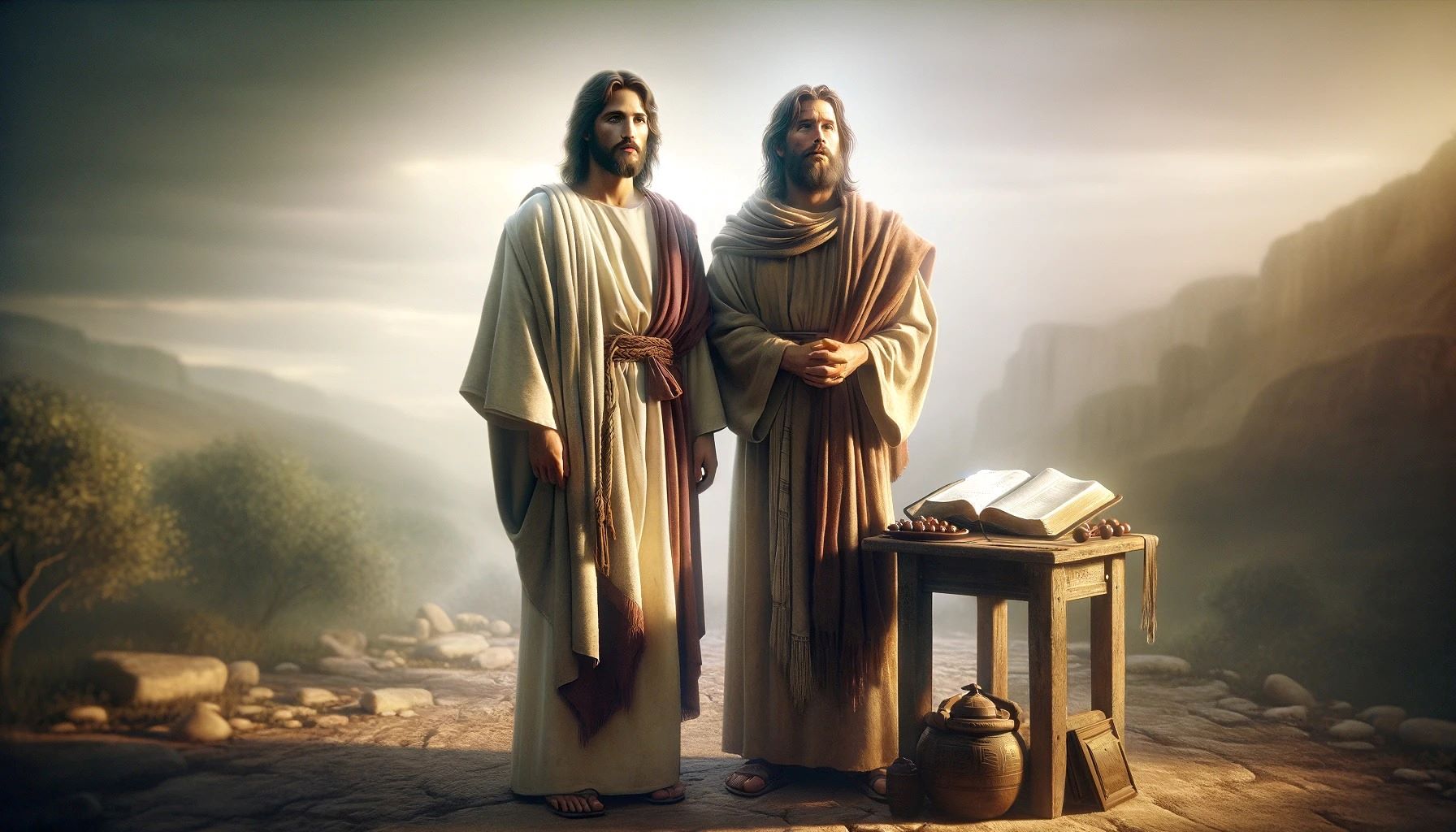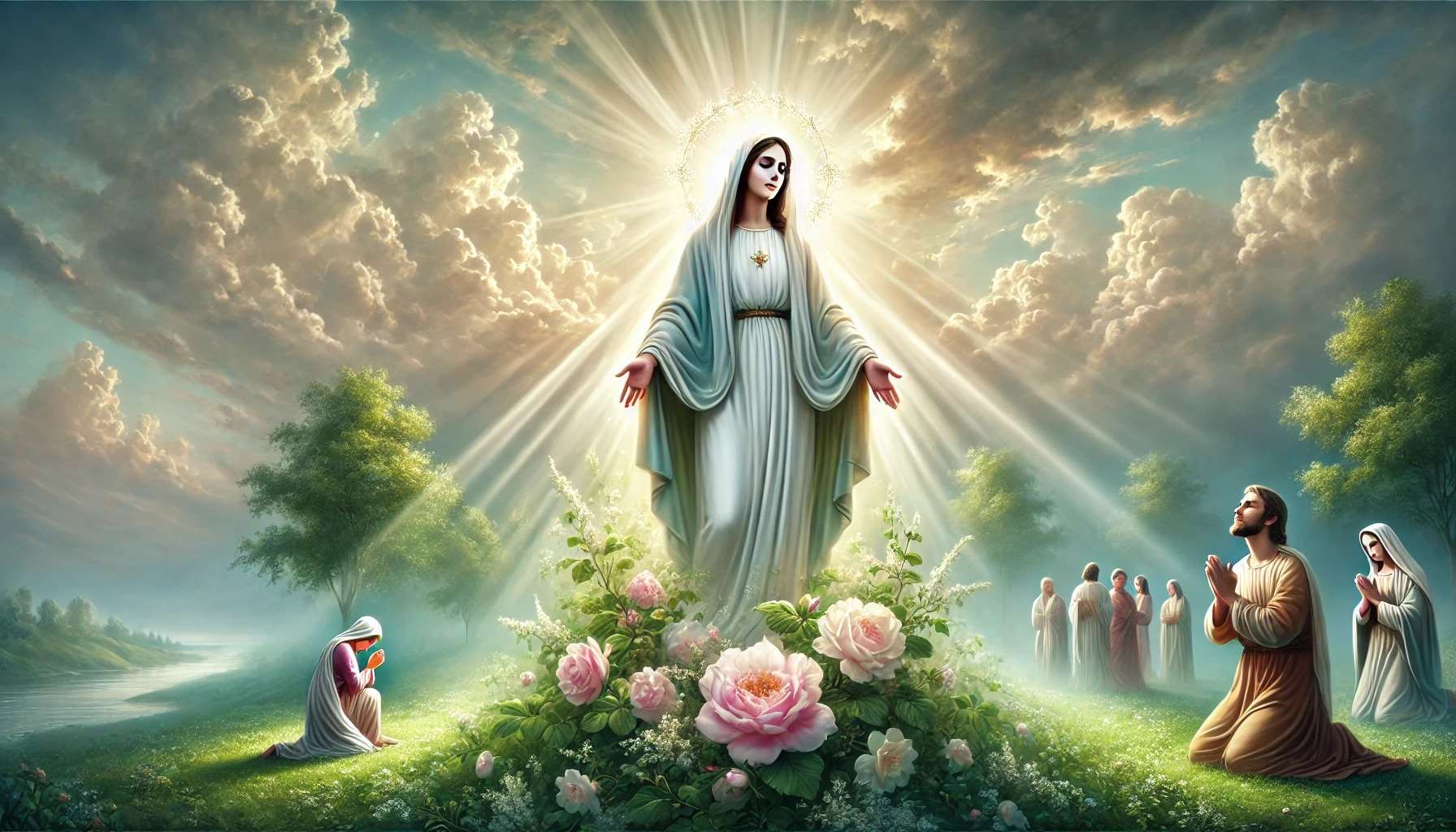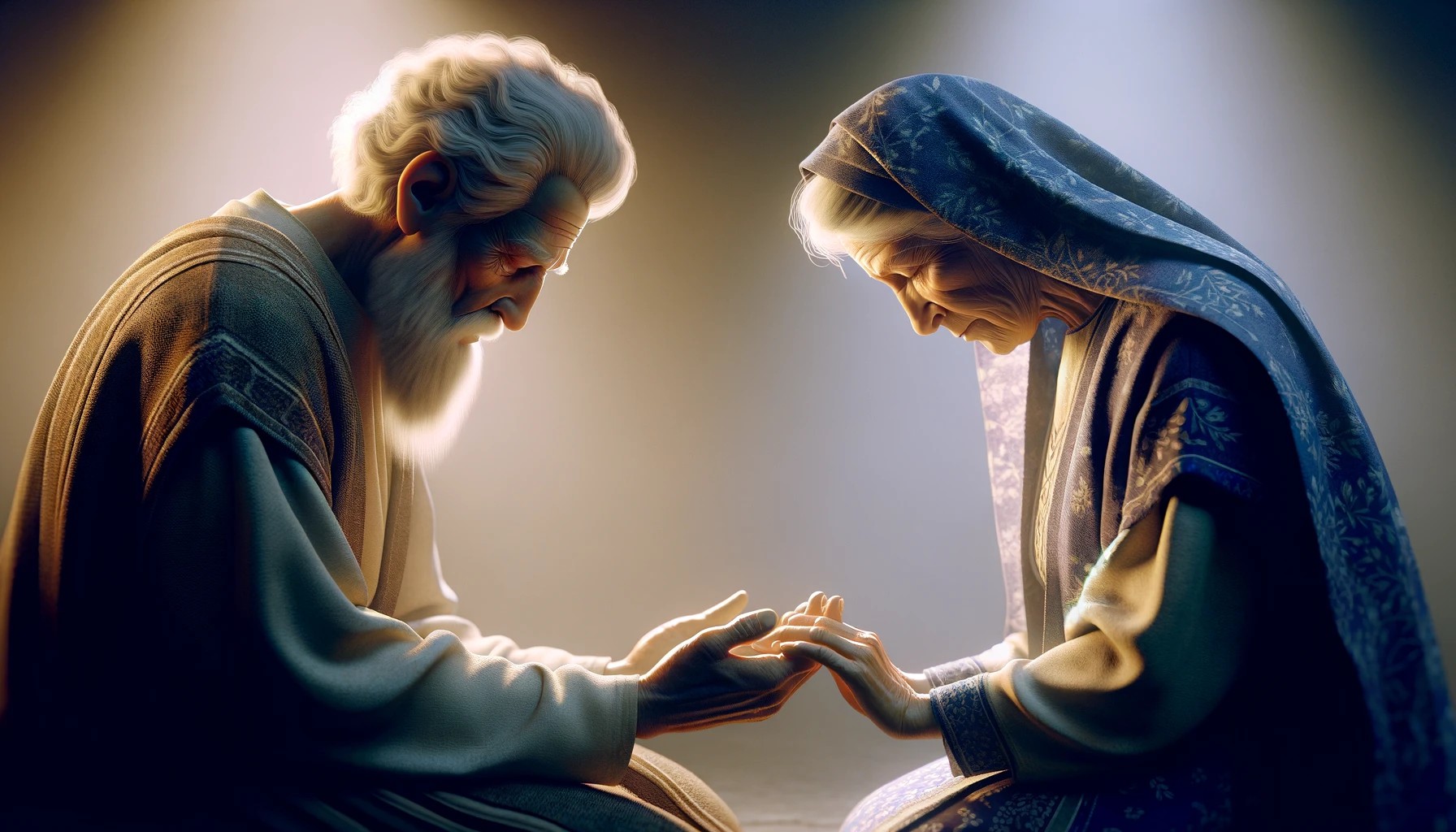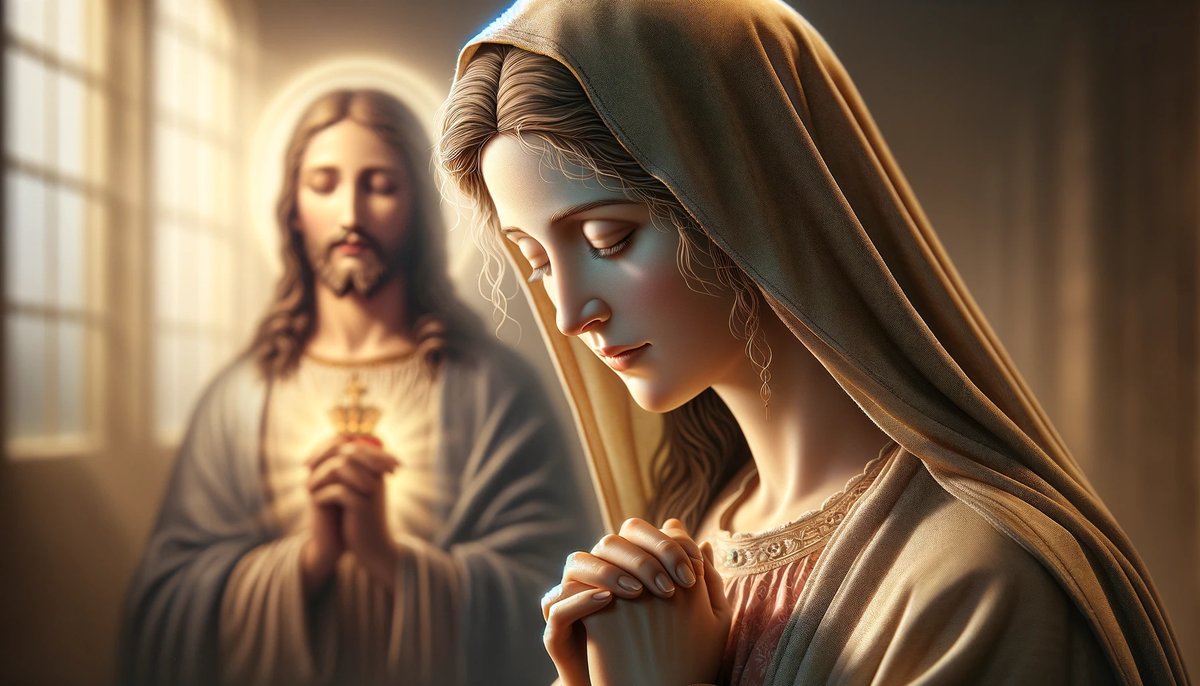Home>Theology and Spirituality>How Was Mary The Mother Of Jesus Related To Elizabeth The Mother Of John The Baptist


Theology and Spirituality
How Was Mary The Mother Of Jesus Related To Elizabeth The Mother Of John The Baptist
Published: February 21, 2024
Jason DeRose, Managing Editor at Christian.net, uses his expertise in religion and journalism to deepen understanding of faith's societal impacts. His editorial leadership, coupled with a strong academic background, enriches the platform’s diverse content, earning him recognition in both journalism and religious circles.
Discover the fascinating connection between Mary, the mother of Jesus, and Elizabeth, the mother of John the Baptist. Explore their relationship in theology and spirituality.
(Many of the links in this article redirect to a specific reviewed product. Your purchase of these products through affiliate links helps to generate commission for Christian.net, at no extra cost. Learn more)
Table of Contents
Introduction
The relationship between Mary, the mother of Jesus, and Elizabeth, the mother of John the Baptist, is a profound and significant aspect of Christian theology. Their connection is deeply rooted in the narratives of the New Testament, specifically in the Gospel of Luke. Understanding the genealogy, annunciation, visitation, and the births of Jesus and John the Baptist provides a rich tapestry of spiritual insight and historical context.
The intertwining of Mary and Elizabeth's lives is a testament to the divine orchestration of events that culminated in the fulfillment of ancient prophecies and the ushering in of a new era in salvation history. Their bond transcends mere familial ties; it symbolizes the convergence of two pivotal figures in the Christian narrative, each playing a crucial role in the unfolding of God's redemptive plan for humanity.
Exploring the intricacies of their relationship unveils a narrative that is both deeply human and profoundly divine. It invites us to contemplate the mysterious ways in which God works through ordinary individuals to bring about extraordinary manifestations of His grace and mercy. As we delve into the genealogy, annunciation, visitation, and the births of Jesus and John the Baptist, we are invited to witness the divine drama that unfolds through the lives of these two remarkable women, offering profound insights into the nature of faith, obedience, and the profound implications of God's intervention in human history.
The story of Mary and Elizabeth serves as a poignant reminder that God's plans often unfold in ways that defy human expectations and understanding. It challenges us to embrace a posture of humility and openness to the miraculous, recognizing that God's purposes are often revealed in the most unexpected and unassuming circumstances. As we embark on this exploration of their intertwined lives, we are beckoned to ponder the profound implications of their encounter and the transformative power of divine encounters in the lives of ordinary individuals.
The Genealogy of Mary and Elizabeth
The genealogy of Mary and Elizabeth is intricately woven into the rich tapestry of biblical history, tracing their lineage back to significant figures in the Old Testament. Understanding their familial roots provides profound insights into the divine orchestration of events leading to the births of Jesus and John the Baptist.
Mary's genealogy is traced back to King David, the iconic monarch of ancient Israel. According to the Gospel of Matthew, Mary is a descendant of David through his son Nathan, while the Gospel of Luke presents a genealogy that traces her lineage through David's son Solomon. These genealogies underscore Mary's royal lineage, establishing her connection to the messianic promises associated with the Davidic covenant.
On the other hand, Elizabeth's lineage is linked to the priestly lineage of Aaron, the brother of Moses. Her husband, Zechariah, is identified as a priest of the division of Abijah, highlighting their esteemed priestly heritage. The convergence of royal and priestly lineages in the persons of Mary and Elizabeth foreshadows the extraordinary roles their offspring would fulfill in the redemptive narrative.
The genealogical ties between Mary and Elizabeth serve as a testament to the intricate interweaving of divine providence and human history. Their ancestral roots connect them to the prophetic promises and sacred traditions of Israel, positioning them as central figures in the fulfillment of ancient prophecies.
As we contemplate the genealogy of Mary and Elizabeth, we are invited to recognize the profound significance of their familial backgrounds in shaping the destinies of their renowned offspring. Their lineage not only establishes their rightful place within the unfolding drama of salvation history but also underscores the meticulous planning and purposeful design inherent in the divine narrative.
The genealogical connections of Mary and Elizabeth serve as a prelude to the remarkable events that would unfold in their lives, setting the stage for the annunciation, visitation, and the births of Jesus and John the Baptist. It is within the context of their ancestral heritage that the divine drama of redemption unfolds, inviting us to marvel at the intricate tapestry of divine providence woven through the lives of these extraordinary women.
The Annunciation of Mary and Elizabeth
The annunciation of Mary and Elizabeth stands as a pivotal moment in the biblical narrative, marking the divine revelation of the miraculous conceptions of Jesus and John the Baptist. The angel Gabriel plays a central role in both annunciations, heralding the extraordinary news that would forever alter the course of human history.
In the Gospel of Luke, the annunciation to Mary unfolds with profound significance. Mary, a young virgin from Nazareth, is visited by the angel Gabriel, who delivers the astonishing message that she has been chosen to bear the Son of God. Faced with this inexplicable revelation, Mary responds with humility and faith, declaring, "Behold, I am the servant of the Lord; let it be to me according to your word." This profound moment encapsulates Mary's unwavering trust in the divine plan, exemplifying her willingness to surrender to God's will despite the incomprehensible nature of the announcement.
Similarly, the annunciation to Elizabeth and her husband, Zechariah, unfolds in a moment of divine intervention. Despite their old age and Elizabeth's barrenness, the angel Gabriel appears to Zechariah while he is performing his priestly duties in the temple, announcing that Elizabeth will conceive a son who will be named John. This miraculous proclamation serves as a testament to the power of God to bring forth life in the most improbable circumstances, reaffirming the divine promise of a forerunner to prepare the way for the Messiah.
The annunciations to Mary and Elizabeth are imbued with profound theological significance, underscoring the divine initiative in orchestrating the events that would lead to the fulfillment of ancient prophecies. These extraordinary encounters serve as a testament to the transformative power of divine intervention in the lives of ordinary individuals, demonstrating the profound implications of God's redemptive plan for humanity.
The annunciations of Mary and Elizabeth serve as a prelude to the remarkable events that would unfold in their lives, setting the stage for the visitation and the births of Jesus and John the Baptist. These divine encounters invite us to contemplate the mysterious ways in which God works through humble and faithful hearts to bring about His extraordinary purposes, underscoring the profound implications of these annunciations for the unfolding drama of salvation history.
The Visitation of Mary and Elizabeth
The visitation of Mary and Elizabeth stands as a poignant and profoundly significant moment in the biblical narrative, encapsulating the convergence of divine providence and human response. Following the annunciation of the miraculous conceptions of Jesus and John the Baptist, Mary embarks on a journey to visit her relative, Elizabeth, who herself is miraculously expecting a child in her old age. This encounter between the two women unfolds with profound theological and spiritual implications, offering a glimpse into the extraordinary ways in which God's redemptive plan unfolds through the lives of ordinary individuals.
As Mary arrives at the home of Elizabeth and Zechariah, she is greeted with a jubilant exclamation from Elizabeth, who is filled with the Holy Spirit. Elizabeth's recognition of the significance of Mary's visit and the child she carries is expressed in her words, "Blessed are you among women, and blessed is the fruit of your womb!" This profound declaration not only acknowledges the unique role that Mary is destined to fulfill in the divine narrative but also underscores the spiritual insight granted to Elizabeth through the Holy Spirit.
In response to Elizabeth's proclamation, Mary offers a deeply moving hymn of praise known as the Magnificat. This eloquent expression of faith and devotion magnifies the greatness of God and celebrates His faithfulness to the humble and the lowly. Mary's exultant words resonate with themes of social justice, divine mercy, and the fulfillment of God's promises, encapsulating the profound implications of the impending births of Jesus and John the Baptist.
The visitation of Mary and Elizabeth serves as a poignant testament to the transformative power of divine encounters and the profound spiritual insight granted to these remarkable women. Their exchange is imbued with a sense of sacred anticipation, as they bear witness to the extraordinary workings of God in their lives and in the fulfillment of ancient prophecies. This encounter not only solidifies the bond between Mary and Elizabeth but also foreshadows the pivotal roles their sons will play in the redemptive narrative.
As we contemplate the visitation of Mary and Elizabeth, we are invited to marvel at the profound implications of their encounter and the spiritual depth it embodies. Their shared experience serves as a testament to the divine orchestration of events and the transformative power of faith, offering profound insights into the mysterious ways in which God works through the lives of those who are receptive to His divine call.
The Birth of Jesus and John the Baptist
The births of Jesus and John the Baptist mark the culmination of divine promises and the fulfillment of ancient prophecies, underscoring the profound significance of these extraordinary events in the redemptive narrative. The Gospel accounts of the births of these two remarkable figures offer a rich tapestry of theological insights and spiritual revelations, inviting us to contemplate the miraculous circumstances surrounding their arrivals and the transformative impact they would have on human history.
The birth of John the Baptist, heralded by the miraculous conception of his elderly parents, Elizabeth and Zechariah, serves as a testament to the power of God to bring forth life in the most improbable circumstances. His arrival, announced by the angel Gabriel, signifies the dawning of a new era and the fulfillment of the prophetic promise of a forerunner who would prepare the way for the Messiah. John's birth is met with awe and wonder, as his father Zechariah, who had been struck mute due to his initial disbelief, is filled with the Holy Spirit and prophesies about the extraordinary role his son would fulfill in the divine narrative.
Similarly, the birth of Jesus in Bethlehem unfolds amidst humble and unassuming circumstances, yet it carries profound implications for the salvation of humanity. The miraculous conception of Jesus through the Holy Spirit and the faithful obedience of Mary, his mother, underscore the divine initiative in bringing forth the long-awaited Savior. The angelic proclamation to the shepherds and the wondrous star that guides the Magi from the East serve as celestial heralds of the extraordinary significance of Jesus' birth, signaling the fulfillment of ancient prophecies and the arrival of the long-awaited Messiah.
The births of Jesus and John the Baptist are imbued with profound theological significance, underscoring the divine intervention in human history and the transformative power of God's redemptive plan. These extraordinary events serve as a testament to the mysterious ways in which God works through ordinary individuals to bring about His extraordinary purposes, inviting us to marvel at the profound implications of these miraculous births for the unfolding drama of salvation history.
As we contemplate the births of Jesus and John the Baptist, we are invited to recognize the profound implications of these extraordinary events for the fulfillment of God's promises and the ushering in of a new era of salvation. Their arrivals not only signify the culmination of divine prophecies but also serve as a poignant reminder of the transformative power of faith, obedience, and the miraculous workings of God in the lives of those who are receptive to His divine call.
Conclusion
The intertwined lives of Mary, the mother of Jesus, and Elizabeth, the mother of John the Baptist, offer a profound tapestry of divine orchestration, human response, and the fulfillment of ancient prophecies. Their genealogical ties, annunciations, visitation, and the births of Jesus and John the Baptist converge to form a narrative that transcends mere historical accounts, offering profound theological insights and spiritual revelations.
The genealogical roots of Mary and Elizabeth link them to the royal and priestly lineages of Israel, positioning them as central figures in the fulfillment of messianic promises and the preparation for the arrival of the Savior. Their ancestral heritage underscores the meticulous planning and purposeful design inherent in the divine narrative, emphasizing the significance of their roles in the unfolding drama of salvation history.
The annunciations to Mary and Elizabeth, heralded by the angel Gabriel, signify the divine initiative in orchestrating the miraculous conceptions of Jesus and John the Baptist. These extraordinary encounters underscore the transformative power of divine intervention in the lives of ordinary individuals, inviting us to contemplate the mysterious ways in which God works through humble and faithful hearts to bring about His extraordinary purposes.
The visitation of Mary and Elizabeth serves as a poignant testament to the transformative power of divine encounters and the profound spiritual insight granted to these remarkable women. Their exchange embodies a sense of sacred anticipation, bearing witness to the extraordinary workings of God in their lives and in the fulfillment of ancient prophecies. This encounter solidifies the bond between Mary and Elizabeth and foreshadows the pivotal roles their sons will play in the redemptive narrative.
The births of Jesus and John the Baptist mark the culmination of divine promises and the fulfillment of ancient prophecies, underscoring the profound significance of these extraordinary events in the redemptive narrative. Their arrivals signify the culmination of divine prophecies and serve as a poignant reminder of the transformative power of faith, obedience, and the miraculous workings of God in the lives of those who are receptive to His divine call.
In conclusion, the intertwined lives of Mary and Elizabeth offer a compelling narrative of divine providence, human faithfulness, and the fulfillment of God's redemptive plan. Their roles as central figures in the arrival of Jesus and John the Baptist serve as a testament to the profound implications of their encounters and the transformative power of divine interventions in the lives of ordinary individuals. As we contemplate their intertwined lives, we are invited to marvel at the profound implications of their roles in the unfolding drama of salvation history, offering profound insights into the nature of faith, obedience, and the profound implications of God's intervention in human history.














